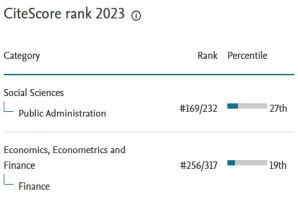A kör négyszögesítése, avagy az ESG-jelentések számszerű minősítése
DOI:
https://doi.org/10.35551/PFQ_2023_2_6Kulcsszavak:
ESG-indikátorok, fenntarthatósági jelentés, könyvvizsgálat, G24, G28, M41, M42, Q01, O56Absztrakt
A vállalkozások életképességét és hosszú távú teljesítményét a piaci szereplők a hagyományos üzleti mutatók mellett a nem pénzügyi – környezeti, társadalmi és irányítási – kockázatok és lehetőségek alapján is egyre gyakrabban értékelik, ás döntéshozatalukban egyre nagyobb hangsúlyt kapnak a fenntarthatósági (ESG) szempontok (Boros at al, 2022). tanulmányunkban szeretnénk felhívni a figyelmet az ESG-jelentések összehasonlíthatósága mögött meghúzódó azon valós problémára, ami a mérhetőségben és a metrikus mérőrendszerek hiányában rejlik. Amíg a számviteli beszámolók a vállalkozást érintő gazdasági események számszerűsített leképezései, addig az ESG-jelentésekben a társadalmi-politikai elvárások és azok hatásai kerülnek megfogalmazásra, melyeket nehéz számszerűsíteni, mérhető formában megjeleníteni. Itt bemutatott kutatásunk az ESG-indikátorok, -adatok, -besorolások, -pontrendszerek és -metrikák kvantitatív és kvalitatív mérésére, megbízhatóságára és összehasonlíthatóságára fókuszál. Hazai és nemzetközi fenntarthatósági jelentések tartalomelemzését elvégezve arra a megállapításra jutottunk, hogy a környezeti, társadalmi és vállalatirányítási teljesítmény mérése során a probléma nem az adatok hiányában, hanem az eszközök és keretrendszerek túlkínálatában keresendő.
Hivatkozások
Boros, A., Lentner, Cs., Nagy, V. (2022) A fenntarthatóság új szempontjai: a nem pénzügyi jelentések európai gyakorlatának elemzése, Pénzügyi szemle, 2022/2 DOI: https://doi.org/10.35551/PSZ_2022_2_2
Delmas, M., & Blass, V. D. (2010). Measuring corporate environmental performance: the trade-offs of sustainability ratings. Business Strategy and the Environment, Volume 19, Issue 4, Page(s) 245–260. DOI: https://doi.org/10.1002/bse.676
Derwall, J., Bauer, R., Guenster, N., & Koedijk, K. G. (2004). The Eco-Efficiency Premium Puzzle. Financial Analysts Journal, Volume 61, Issue 2. March/April 2005, Page(s) 51–63. DOI:10.2469/faj.v61.n2.2716
Devalle, A., Simona, F., & Cantino, V. (2017). The linkage between ESG performance and credit ratings: A firm-level perspective analysis. International Journal of Business and Management, Vol. 12, No. 9, Aug. 2017, Page(s) 53–65. DOI:10.5539/IJBM.V12N9P53
Edmans, A. (2011). Does the stock market fully value intangibles? Employee satisfaction and equity prices. Journal of Financial Economics, Volume 101, Issue 3. September 2011, Page(s) 621–640.
Escrig-Olmedo, E., Fernández-Izquierdo, M. Á., Ferrero-Ferrero, I., Rivera-Lirio, J. M., & Muñoz-Torres, M. J. (2019). Rating the raters: Evaluating how ESG rating agencies integrate sustainability principles. Sustainability, Volume 11, (3), 915. DOI:10.3390/SU11030915
Friede, G., Busch, T., & Bassen, A. (2015). ESG and financial performance: Aggregated evidence from more than 2000 empirical studies. Journal of Sustainable Finance & Investment, Vol. 5, No. 4, Dec. 2015, Page(s) 210–233. DOI:10.1080/20430795.2015.1118917
Kotsantonis, S., & Serafeim, G. (2019). Four things no one will tell you about ESG data. Journal of Applied Corporate Finance, Volume 31, Number 2, Page(s) 50–58. DOI: https://doi.org/10.1111/jacf.12346
Liern, V., & Pérez-Gladish, B. (2018). Ranking corporate sustainability: A flexible multidimensional approach based on linguistic variables. International Transactions in Operational Research, Volume 25, Issue 3, Page(s) 1081-1100. DOI:10.1111/itor.12469
Pagano, M. S., Sinclair, G., & Yang, T. (2018). Understanding ESG ratings and ESG indexes. In Research handbook of finance and sustainability. Edward Elgar Publishing. (2018) Edited by Sabri Boubaker, Douglas Cumming and Duc K. Nguyen ISBN 9781786432629, Pages: 339–371 DOI:10.4337/9781786432636.00027
Windolph, S. E. (2011). Assessing corporate sustainability through ratings: challenges and their causes. Journal of Environmental sustainability, Volume 1, Issue 1, Article 5, Page(s) 37–57. DOI:10.14448/JES.01.0005
The Global Compact (2004) Who Cares Wins, Connecting Financial Markets to a Changing World. Recommendations by the financial industry to better integrate environmental, social and governance issues in analysis, asset management and securities brokerage. Swiss Federal Department of Foreign Affairs and United
Nations. United Nations Department of Public Information, 57899 December 2004. Letöltés dátuma: 2022. 04. 09.
Transforming Our World: The 2030 Agenda For Sustainable Development (2015) United Nations, A/RES/70/1, sustainabledevelopment.un.org, Pdf. United Nations, Department of Economic and Social Affairs, Sustainable Development – https://sdgs.un.org/publications/ transforming-our-world-2030-agenda-sustainable-development-17981 – Letöltés dátuma: 2022. 04. 23.
SDG Indicators, Global indicator framework for the Sustainable Development Goals and targets of the 2030 Agenda for Sustainable Development, Pdf. United Nations, Department of Economic and Social Affairs, Statistics Division – https://unstats.un.org/sdgs/indicators/ indicators-list/ – Letöltés dátuma: 2022. 04. 23.
Refinitiv (2022) Environmental, Social and Governance Scores from Refinitiv, March 2022. An LSEG Business – https://www.refinitiv.com/content/dam/marketing/en_us/documents/ methodology/refinitiv-esg-scores-methodology.pdf – Letöltés dátuma: 2022. 05. 07.
MSCI ESG Ratings Methodology (2022) Methodology Document MSCI ESG Research LLC, April 2022. – https://www.msci.com/documents/1296102/21901542/ESG-Ratings-Methodology-Exec-Summary.pdf – Letöltés dátuma: 2022. 05. 07.
Sustainalytics (2021) ESG Risk Ratings - Methodology Abstract, Version 2.1 January
Sustainalytics, a Morningstar company – https://connect.sustainalytics.
com/hubfs/INV/ Methodology/Sustainalytics_ESG%20Ratings_Methodology%
Abstract.pdf – Letöltés dátuma: 2022. 05. 07.
ISS (2021) ISS ESG Corporate Rating, Methodology & Research Process, 2021. –
https://www.issgovernance.com/file/publications/methodology/Corporate-
Rating-Methodology.pdf – Letöltés dátuma: 2022. 05. 07.
S&P Global Ratings (2020) Environmental, Social, And Governance Evaluation
Analytical Approach Dec. 15, 2020 – https://www.spglobal.com/_assets/
documents/ratings/research/ 100048049.pdf?utm_medium=cpc&utm_
source=google&utm_campaign=CSA_Search – Letöltés dátuma: 2022. 05. 07.
FTSE Russell (2020) ESG Ratings and data model, Integrating ESG into investments, Product overview, 2020. https://research.ftserussell.com/products/downloads/ESG-ratings-overview.pdf – Letöltés dátuma: 2022. 05. 07.
RepRisk (2021) RepRisk methodology overview, RepRisk AG, April 2022 – https://www.reprisk.com/news-research/resources/methodology#pdf – Letöltés dátuma: 2022. 05. 07.
Arabesque S-Ray (2020) Methodology (v.2.6) September 2020 – https://arabesque.com/docs/sray/S-Ray%20Methodology%20v260.pdf – Letöltés dátuma: 2022. 05. 07.
##submission.downloads##
Megjelent
Hogyan kell idézni
Folyóirat szám
Rovat
License
Authors assign copyright to Pénzügyi Szemle / Public Finance Quarterly. Authors are responsible for permission to reproduce copyright material from other sources.












